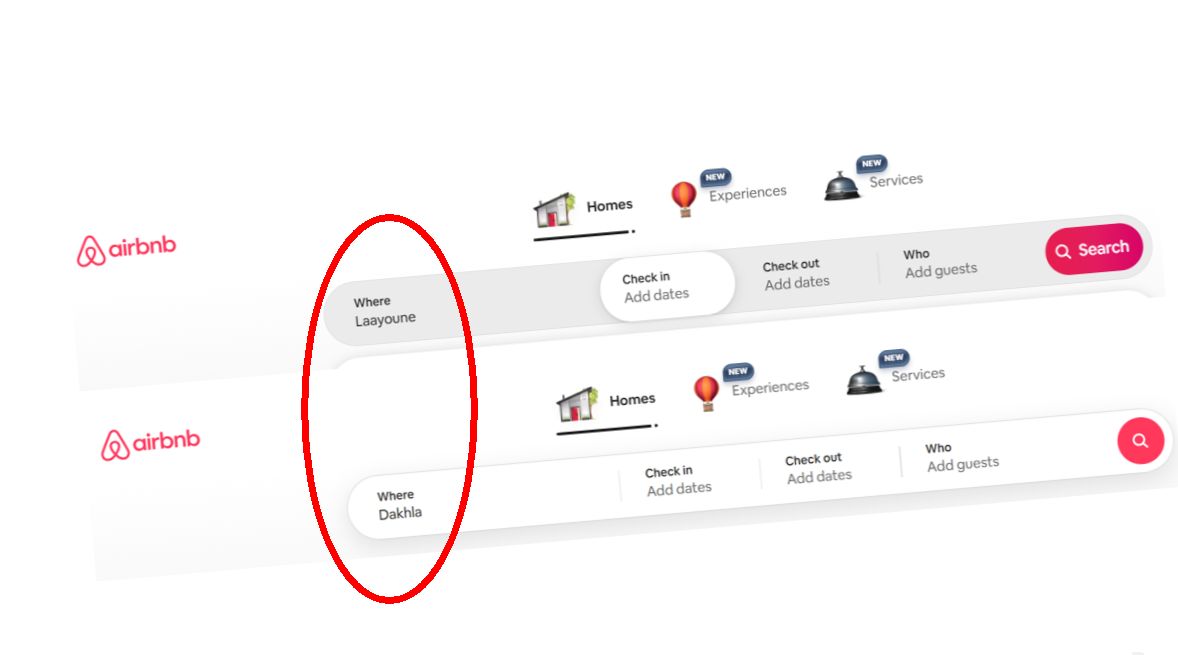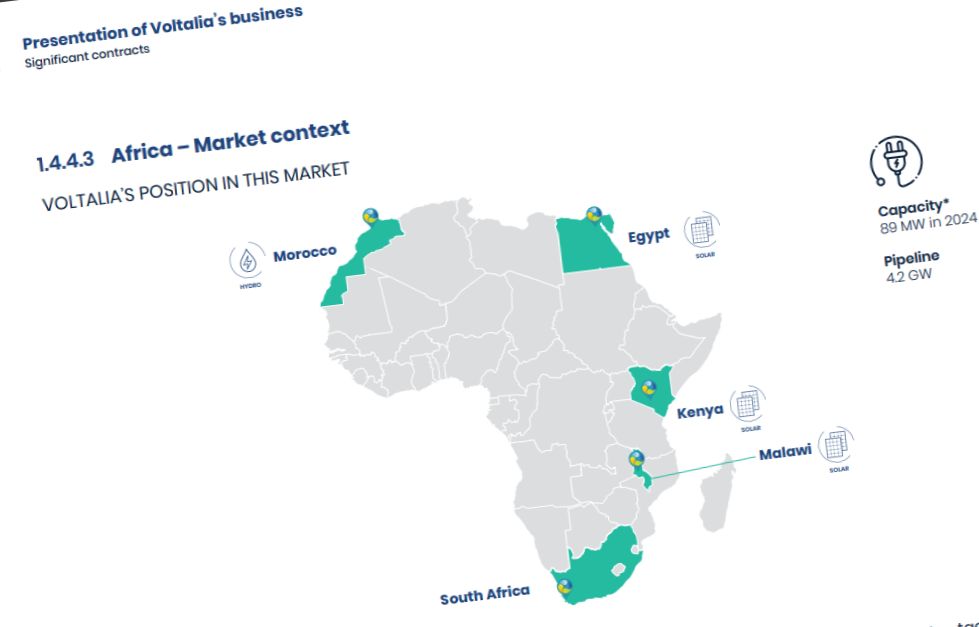
Eight UN rapporteurs call on Morocco to stop tearing down Saharawi property as the Kingdom expands green energy projects in occupied Western Sahara.
Picture: One of many construction projects in Western Sahara. One of the landgrab allegations submitted to the UN bodies concerns this particular company. @ElliLorz.
In a statement published last week, eight UN Special Rapporteurs have denounced Morocco’s ongoing campaign of repression, racial discrimination, and violence against Sahrawi human rights defenders, journalists, and advocates for self-determination, covering 79 victims as reference cases.
Part of the massive materials that the UN experts have analysed, is the demolition of Saharawi homes by the Moroccan government to make place for infrastructure projects.
The experts call on Morocco to “provide information on the measures taken to offer adequate compensation or alternative housing, as well as legal remedies, to individuals and households affected by the demolitions and forced evictions, and to prevent further demolitions and forced evictions.”
The joint communication called on Morocco to uphold its international human rights obligations and to ensure that the people of Western Sahara can fully exercise their right to self-determination, in accordance with international law.
While the statement itself was only published last week, the conclusion had already been made on 20 March 2025.
The elements on confiscation and evictions reads as follows (unofficial translation):
According to received information, the Moroccan authorities carried out a large-scale land acquisition operation along the coast of Western Sahara. This operation involved the destruction of private properties and forced evictions, primarily targeting Sahrawi huts and houses near the ocean. It is believed that the operation aims to clear the area for wind energy, green hydrogen, and tourism projects.
Reportedly, the land acquisition began in the Lamside area, where dozens of huts and houses were destroyed. Sahrawi homes and belongings were allegedly destroyed by bulldozers or set on fire. The operation continued in other regions, including Agte Baba Ali, Boulemaayrdat, and Foum El Oued. Local activists witnessed and documented the widespread burning of Sahrawi homes and huts, including their contents, despite protests from the owners, who were forcibly removed. Some homeowners were injured during the operation. The campaign continued in the northern coastal areas, where Sahrawi homes north of Wadi Saqia El Hamra were demolished.
It is believed that hundreds of Sahrawis were targeted and forcibly displaced as part of this operation. However, very few of those who lost their homes are willing to speak publicly, fearing retaliation from Morocco and private companies.
According to information received, on the beach of Boulemaayrdat near El Aaiún, more than a hundred Sahrawi families owned vacation homes where they had spent their summer holidays for decades. The use of these homes was an important part of Sahrawi culture, serving as a place of rest away from the city and the heavy Moroccan police and military presence in El Aaiún. Since November 2010, following the dismantling of the Gdeim Izik camp, Moroccan authorities have prohibited Sahrawis from spending the night in these houses, only allowing daytime visits, and requiring departure before sunset. Moroccan authorities began burning these homes in February 2022 and continued in February 2024. It has been reported that more than one hundred Sahrawis lost their homes on the beach of Boulemaayrdat, including Mr. Dah Mustapha, Mr. El Fakir Bombi, Mr. Saïd Haddad, and Mr. Mohamed Laghrid.
On February 4, 2023, Moroccan auxiliary forces allegedly set fire to and destroyed the house of Mr. Dah Mustapha. Mr. Mustapha was not present at the time and received no prior warning before his property was destroyed.
Reportedly, early in the morning of February 13, 2024, Moroccan auxiliary forces and the Royal Gendarmerie came to the home of Mr. El Fakir Bombi, ordering him to leave his hut and remove his furniture and car from the garage, or they would burn everything. Mr. Bombi refused, stating that he needed time to dismantle the hut as he had spent a lot of money building it. The authorities then set the house on fire. Mr. Bombi rushed to get his car out of the garage and drive it away from the fire, which quickly engulfed the hut and destroyed the rest of his belongings.
It was also reported that early on February 13, 2024, Mr. Saïd Haddad’s home was destroyed by the auxiliary forces and the Royal Gendarmerie. They arrived at his house, asked him to leave, and immediately set it on fire.
Similarly, Mr. Mohamed Laghrid was reportedly told to vacate his home at 7:00 a.m. on February 13, 2023, by the auxiliary and gendarmerie forces. Mr. Laghrid asked if he could first remove the wood to reuse or sell it, but they refused and immediately set the house on fire.
On February 16, 2024, the head of the Takh region led the demolition of a hut near the sea belonging to Sahrawi activist Mr. Ahmed Salem Hamida. Mr. Hamida was also verbally assaulted and threatened with arrest after protesting the destruction of his hut and those of his family members.
According to received reports, in another land acquisition case, Ms. Salma Lekhlifi and her family had part of their family home confiscated by Moroccan authorities in 2020, and the authorities are now attempting to seize the remainder of the land to make way for new housing for Moroccan settlers. Ms. Lekhlifi’s family has faced retaliation from Moroccan forces for making the case public, including abuse, intimidation, and threats. The family has also been subjected to intimidation and threats by local authorities and private companies, and now fears for their lives.
The communication follows a series of previous UN communications raising various concerns over the past five years, denouncing systematic racial discrimination and targeting of Saharawi identity. Despite Morocco’s responses to many of these letters, the UN experts note with alarm that patterns of repression, harassment, and discrimination against Sahrawi individuals and organizations have not only continued but worsened. This is, however, the first time that the UN Human Rights Council bodies have commented on such landgrabbing, as far as WSRW is aware, with the UN experts calling on Morocco to provide adequate compensation to the victims and to prevent further demolitions and forced evictions of Saharawis.
In a response of 16 May 2025, Morocco largely denied the allegations, claiming that the communication is a result of the politicization and weaponization of the UN Special Procedures against Morocco.
Morocco has contracted companies like Enel, Engie and GE Vernova to carry out projects in the occupied territory, without the consent of the Saharawi people.
The UN communication is a result of a complaint submitted by the Working Group on Human Rights in Occupied Western Sahara (WGHRWS), the Sahrawi Association of Victims of Grave Human Rights Violations Committed by the Moroccan State (ASVDH) and CODESA, the collective of Saharawi human rights defenders.
“The communication exposes the systematic and widespread targeting of Saharawi activists and defenders. Yet, it barely begins to reveal the relentless daily suppression endured by the Saharawi people in Occupied Western Sahara”, the organizations stated in a press release. “Despite repeated UN condemnations, Morocco continues to target Sahrawi civilians simply for who they are — with complete impunity. The situation is growing more dangerous by the day, as the UN has been denied access to the territory for nearly a decade, leaving human rights protection non-existent and neglected.”
To highlight the current situation in occupied Western Sahara and the content of the latest UN document, the submitting organizations will on 14 June 2025 organize a webinar.
The UN Joint Statement was signed by K.P. Ashwini, UN Special Rapporteur on contemporary forms of racism, racial discrimination, xenophobia and related intolerance, Irene Khan, UN Special Rapporteur on the promotion and protection of the right to freedom of opinion and expression, Gina Romero, UN Special Rapporteur on the rights to freedom of peaceful assembly and of association, Balakrishnan Rajagopal, UN Special Rapporteur on the right to adequate housing as a component of the right to an adequate standard of living, and on the right to non-discrimination in this context, Mary Lawlor, UN Special Rapporteur on the situation of human rights defenders, Margaret Satterthwaite, UN Special Rapporteur on the independence of judges and lawyers, Alice Jill Edwards, UN Special Rapporteur on torture and other cruel, inhuman or degrading treatment or punishment and Reem Alsalem, UN Special Rapporteur on violence against women and girls, its causes and consequences. Noting the serious concerns raised, the eight UN experts called on Morocco to;
- Indicate the measures taken to ensure that the people of Western Sahara can fully exercise their right to self-determination, in accordance with international law and measures taken to guarantee a referendum to choose between independence for Western Sahara and integration into Morocco.
- Measures taken to guarantee, in law and in practice, the effective exercise by Sahrawis of their rights to freedom of expression, association, and peaceful assembly.
- Measures taken to ensure that all Sahrawi activists, human rights defenders, journalists, and lawyers, including women, can carry out their activities without undue interference and without fear of reprisals, violence, and/or unjustified restrictions on their activities.
- Measures taken to ensure that all cases of repression, including excessive use of force by law enforcement, surveillance, intimidation, and reprisals against Sahrawis, are effectively, thoroughly, and impartially investigated, that perpetrators are punished, and that victims receive adequate reparations.
- Measures taken to provide adequate compensation or alternative housing, as well as legal remedies, to individuals and households affected by demolitions and forced evictions, and to prevent further demolitions and forced evictions.
Previous UN communications on related matters include MAR 1/2025, MAR 2/2024, MAR 2/2023, MAR 3/2022, MAR 4/2021, MAR 5/2021, MAR 5/2020, MAR 3/2020, MAR 2/2020, MAR 5/2019, MAR 2/2019, and MAR 1/2019.
Since you're here....
WSRW’s work is being read and used more than ever. We work totally independently and to a large extent voluntarily. Our work takes time, dedication and diligence. But we do it because we believe it matters – and we hope you do too. We look for more monthly donors to support our work. If you'd like to contribute to our work – 3€, 5€, 8€ monthly… what you can spare – the future of WSRW would be much more secure. You can set up a monthly donation to WSRW quickly here.
Morocco to double dirty green energy in occupied Western Sahara
The Moroccan government is allegedly planning a $2.1 billion investment in new controversial infrastructure projects in occupied Western Sahara.
Airbnb kicks Morocco out of Western Sahara
The home-sharing company has removed references to “Morocco” from locations in occupied Western Sahara.
Voltalia hides Western Sahara controversy from reports?
The French renewable company no longer includes its wind farm in occupied Western Sahara in its public financial reporting.
Morocco allocates land in occupied Western Sahara to green hydrogen investors
Morocco’s ambitions to become a global green hydrogen powerhouse are accelerating. Yet, Rabat is allocating land in a territory it does not legally own.



